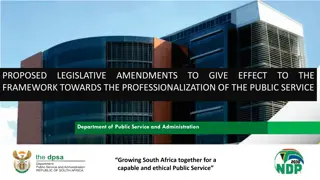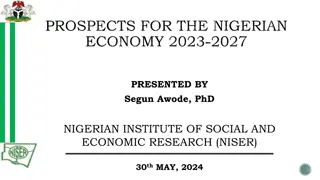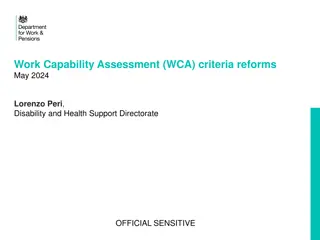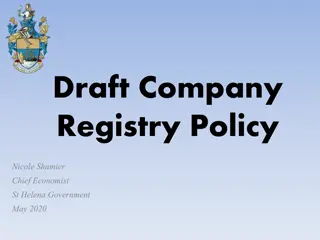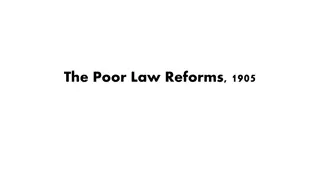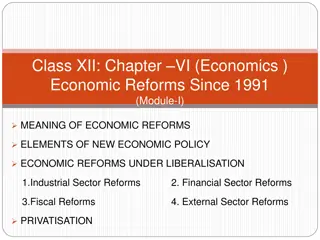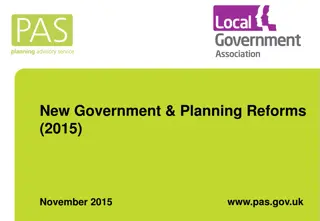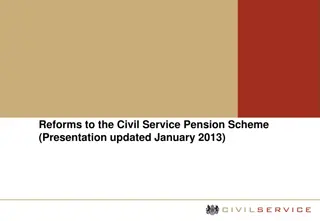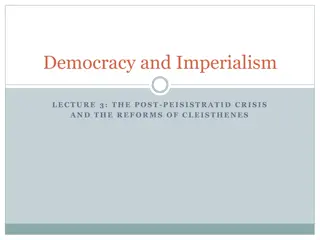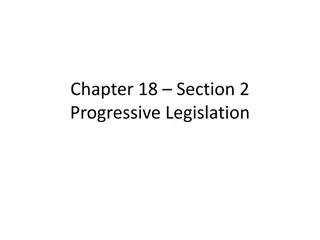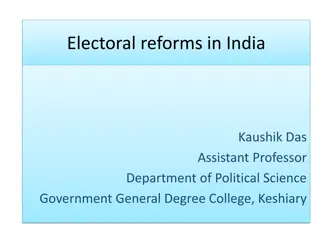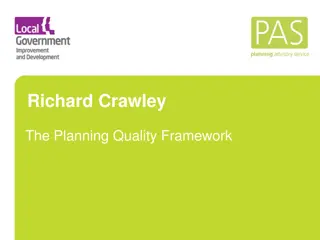Reform Efforts in the Ottoman Empire: 18th and 19th Century Transformations
The Ottoman Empire underwent a series of reforms from the late 18th to the 19th century, aiming to centralize power, boost revenues, strengthen the military, educate bureaucrats, refine legal systems, and improve healthcare. Factors driving these reforms included military weaknesses, separatist nati
0 views • 19 slides
Department of Personnel Management Reforms Workshop Report
This report outlines key business drivers, issues identified, impact assessment, recommendations, and a way forward for the Department of Personnel Management's reforms workshop held in Port Moresby. It discusses the purpose of realigning the public service through cost exercises and controlling exp
1 views • 20 slides
Challenges and Opportunities for Reforms of Non-Oil Revenues Administration in South Sudan
The presentation highlights the reliance on oil revenues in South Sudan and the need for reforms in non-oil revenue administration. It discusses sources of non-oil revenue, factors hindering revenue mobilization, and opportunities for reforms to diversify the economy. The objectives of non-oil reven
3 views • 23 slides
Rise Up, Step Up, Speak Up: DPM Reforms Overview
The Department of Personnel Management (DPM) in Papua New Guinea is undergoing significant reforms to enhance the public service workforce, address issues such as aging staff and inefficiencies, and modernize employment terms. The initiatives include health and life insurance policies, a national ho
0 views • 14 slides
Status of Family Laws in India: Hindu vs. Religious Minorities
The family and personal status laws in India vary between Hindu law and those pertaining to religious minorities. While Hindu law has seen extensive reforms, discriminatory provisions still exist. In contrast, laws governing religious minorities have undergone fewer reforms, leading to greater inequ
2 views • 4 slides
Proposed Legislative Amendments for Professionalization of Public Service
This presentation outlines proposed legislative reforms to enhance the professionalization of the public service in South Africa. Key areas targeted include managing the political-administrative interface, training and development of employees, promoting ethical conduct, and more. Priority legislati
1 views • 8 slides
Prarthana Samaj
Prarthana Samaj, meaning "Prayer Society" in Sanskrit, was founded in 1867 by Atmaram Pandurang with the objective of promoting belief in one God and advocating worship of the same. The movement gained traction when Mahadev Govind Ranade joined, with intellectuals advocating social system reforms. I
5 views • 12 slides
Prospects for the Nigerian Economy 2023-2027: Insights and Analysis
Nigeria's economic journey from 1999 to the present, highlighting key administrations, policy shifts, and economic reforms. The period saw the establishment of democratic governance, economic diversification efforts, infrastructural investments, and bold reforms such as fuel subsidy and exchange rat
0 views • 39 slides
Work Capability Assessment (WCA) Criteria Reforms May 2024
The Work Capability Assessment (WCA) determines if individuals claiming ESA and/or UC have limited capability for work (LCW) or work-related activity. Reforms aim to better support disabled individuals to engage with work. Consultation responses highlighted the need for changes in assessing disabili
0 views • 6 slides
Government Services Reforms in Vanuatu Public Service Commission
Chairman Martin Mahe is leading innovative reforms in the Vanuatu Public Service Commission to improve service delivery. The focus is on a robust legislative framework, clear procedures in the Public Service Staff Manual, rigorous performance management, and policy development for effective decentra
0 views • 10 slides
Proposal for Tax and Regulatory Reforms in St. Helena Company Registry
St. Helena Government is proposing tax reforms to broaden the tax base, enhance transparency, and comply with international standards. Key aspects include taxing global profits, minimum tax charges for companies, and following EU substance rules for company management. The aim is to create new reven
0 views • 10 slides
Financial Sector Reforms in India: An Overview
In the early 1990s, India witnessed significant reforms in its financial sector, addressing issues like lack of transparency, extensive regulation, and financial repression. Key reforms included setting up expert committees, reducing SLR and CRR, implementing prudential norms, and deregulating inter
0 views • 18 slides
Evolution of Reserve Bank of India: A Historical Overview
The Reserve Bank of India, established in 1935 and headquartered in Mumbai since 1937, has played a crucial role in India's financial landscape. From nationalization in 1949 to financial reforms in 2000, this summary covers key milestones in RBI's history, including regulatory expansions, nationaliz
0 views • 18 slides
Narasimham Committee and Indian Banking Reforms
Narasimham Committee, established in 1991 and 1998, played a pivotal role in restructuring the Indian banking sector. The committees, headed by Shri M. Narasimham, addressed issues like low economic growth, non-performing assets, unsatisfactory customer service, and outdated banking systems. They in
0 views • 10 slides
The Poor Law Reforms of 1905: Addressing Unemployment in England
At the turn of the 20th century, England's working class, especially in mining regions, faced unemployment due to industry challenges. The Liberal party promised and initiated reforms, including replacing poor law unions, abolishing punitive relief, and introducing public assistance programs and soc
0 views • 16 slides
Integrated Energy Planning Workshop Overview
This content provides insights into an Energy Balance and Planning Models workshop conducted by Gabriel Hernandez, focusing on the planning process, energy planning principles, and integrated energy planning. It covers topics such as defining objectives, collecting information, scenario visualizatio
0 views • 7 slides
Economic Reforms Since 1991: Liberalisation and Industrial Sector Reforms
Economic reforms initiated in 1991 under the New Economic Policy focused on liberalisation, privatisation, and globalisation to accelerate economic growth. Liberalisation involved deregulation of the industrial sector, abolishment of industrial licensing, reduction of public sector industries, de-re
0 views • 9 slides
Strategic Planning for Sustainable Development: A Comprehensive Overview
Planning and strategic planning play crucial roles in achieving sustainable development goals. This presentation delves into the concepts of planning, strategic planning, sustainable development, the SDGs, types of planning, steps in the strategic planning process, and the importance and challenges
0 views • 20 slides
Progressive Reforms and Social Movements in American Life
The Progressive era in American history saw significant reforms in three key areas: Temperance (alcohol), Women's Rights, and Civil Rights. Various laws, organizations, and individuals played crucial roles in driving these reforms, such as the 18th Amendment, the National Woman's Party, the 19th Ame
0 views • 7 slides
Government Planning Reforms & Manifesto Commitments 2015
Comprehensive overview of government planning reforms from 2010-15, including priorities, manifesto commitments, and productivity plan measures. Emphasizes housing supply, home ownership, local growth, public services, and protection of green spaces. Highlights simplification of policies, community
0 views • 57 slides
Evolution of the Kenyan Water Sector: Reforms and Innovations
The Kenyan water sector has undergone significant reforms and institutional changes over the years. Beginning with the establishment of the Ministry of Water in 1974, followed by the enactment of the Water Act 2002 and subsequent reforms, new institutions such as WASREB, WSBs, WRMA, and WSPs were cr
0 views • 15 slides
Structuration Analysis of Central Government Accounting Practices and Reforms in Emerging Economies: A Study from Nepal
Delve into the nuances of central government accounting practices and reforms in emerging economies, focusing on Nepal. The study explores why key stakeholders resist externally-driven changes, investigates the unintended consequences of reforms, and highlights the role of organizational actors in s
0 views • 21 slides
Minnesota Housing Reform: Addressing Segregation and Affordable Housing Challenges
This content covers various aspects of housing reform in Minnesota, ranging from the Legalizing Affordable Housing Act HF2235, addressing Twin Cities housing segregation, challenges faced by cities in recovering infrastructure costs, and proposed reforms like enabling development impact fees and env
0 views • 18 slides
Need for Changes in the Law of Evidence: Perspectives and Reforms
Information by which facts are proved forms the essence of the law of evidence, regulating how facts are established in courts. This article discusses the exclusionary ethos, statutory reforms, challenges with hearsay evidence, and examples of reforms from different countries like England, Wales, Au
0 views • 18 slides
Evaluation of Labour Reforms 1945-51 and Their Impact on Poverty Alleviation
Following their landslide victory in 1945, the Labour Government under Clement Attlee implemented a series of reforms aimed at addressing poverty in post-WWII Britain. The Beveridge Report highlighted the giants of poverty - Want, Disease, Idleness, Squalor, and Ignorance - serving as the blueprint
0 views • 29 slides
Overview of Aged Care Reforms in May 2014
Aged Care Reforms in May 2014 introduced significant changes to the aged care sector in Australia. The reforms aimed at providing quality care for older Australians, reducing red tape, and enhancing services such as Home Care Packages, MyAgedCare, and the Australian Aged Care Quality Agency. Changes
0 views • 45 slides
Early Childhood Education and Care in Croatia: Overview and Reforms
Early Childhood Education and Care (ECEC) in Croatia has evolved over the years with reforms targeting parental leave, family benefits, and preschool programs. The system includes nurseries, kindergartens, and preschools, with public providers dominating. Recent reforms have introduced quality stand
0 views • 19 slides
Overview of Civil Service Pension Scheme Reforms
Explore the recent reforms in the Civil Service Pension Scheme, covering changes in contributions, introduction of a new pension scheme, reasons for the reforms, current scheme details, and the transitioning stages. Understand the impact on pension benefits and find resources for further information
0 views • 23 slides
Labor Market Reforms and Unemployment: A Detailed Analysis
Labor market reforms and their impact on unemployment rates are examined through a Difference-in-Differences analysis in this study led by Armingeon and Baccaro in June 2013. The research questions whether liberalizing reforms actually reduce unemployment and increase employment levels. The findings
0 views • 13 slides
Athenian Democracy: Post-Peisistratid Crisis and Cleisthenes's Reforms
After the rule of Peisistratus, Athens faced a crisis that led to the reforms of Cleisthenes. Solon's reforms had set a foundation, but tensions remained between rich and poor. The Solonic constitution established a system involving magistrates, the Areopagus Council, and the Assembly. The interplay
0 views • 22 slides
Reforms in GCSE, AS, and A-Level Education in England
Reforms in GCSE, AS, and A-Level qualifications in England aim to align the educational system with global standards, enhancing the rigor of content and assessments. Changes include new grading scales, stand-alone AS qualifications, and expanded subject offerings. These reforms impact students start
0 views • 30 slides
Progressive Reforms in the United States
Progressive movements in the United States during the late 19th and early 20th centuries led to significant legislative changes at the federal, state, and municipal levels. Efforts focused on expanding the role of government in social welfare programs, municipal reforms to combat corruption, innovat
0 views • 10 slides
Public Sector Reforms in Malawi: Impact on Economic Performance
The presentation explores the link between public sector reforms and economic underperformance in Malawi. It discusses the history of public sector reforms in Africa and Malawi, employee relations, and various generations of reforms. The context of Malawi's economic realities at independence and res
0 views • 63 slides
Understanding the Planning Advisory Service: Key Facts and Recommendations
The Planning Advisory Service (PAS) is a vital resource for local planning authorities, funded by DCLG and established in 2004. This service aims to enhance planning services, drive improvements, and navigate changes within the planning system. PAS supports, promotes, and innovates planning practice
0 views • 28 slides
Strategic Staff Planning for Future Success
Strategic Staff Planning involves aligning workforce to future goals through short and long-term approaches. It includes 3 Horizons, Operational Workforce Planning, and Strategic Workforce Planning to ensure capabilities match organizational strategies. The process spans from tactical short-term pla
1 views • 9 slides
Understanding Electoral Reforms in India
Electoral reforms in India are crucial for ensuring free and fair elections, which are fundamental to the success of democracy. This article delves into the need for electoral reforms in India, discussing issues such as money power, muscle power, criminalization in politics, and the misuse of offici
0 views • 15 slides
Inclusion Programme & SEND Reforms in Sheffield Update for School Governors (June 2016)
Sheffield is undergoing significant reforms in its inclusion programme and SEND services, aiming to provide better support for vulnerable young people and their families. The vision includes a shift towards a locality model, ensuring high-quality inclusive provision, robust mental health support, an
0 views • 13 slides
Challenges in Government Planning: The Importance of Quality Frameworks
Research by Richard Crawley highlights concerns regarding government planning performance targets leading to perverse behavior and the need for a focus on good practices in local planning authorities. The Planning Advisory Service (PAS) since 2009 has been facilitating benchmarking to improve planni
0 views • 8 slides
NSW Consent Reforms: Legislative Changes and Impacts on Sexual Assault Laws
In the past 40+ years, the NSW legislative landscape has seen significant changes in addressing sexual assault, culminating in the recent Crimes Legislation Amendment (Sexual Consent Reforms) Act 2021. These reforms implement recommendations, introduce affirmative consent model, and enhance provisio
0 views • 32 slides
Big Bang Reforms in China's Financial Sector by Sunanda Sen
This article discusses significant reforms in China's financial sector, including changes in capital account regulation, balance of payments components, financial instabilities, and offshore centers like Shanghai FTZ. The reforms cover topics such as exchange rate adjustments, deregulated interest r
0 views • 8 slides





